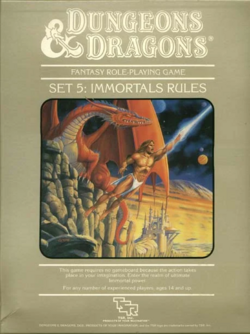I really wish dnd had a way to make your charecter ascend to becoming a devil or demon and gave you that kind of statblock, creating this kinda stuff for dnd is litterally free it costs some paper to print but can make wizards a ton of money.
They kind of did, way back when, for Basic D&D:

The problem with this, and the reason they'd never do something similar officially for 5e or any hypothetical future system, is there's really no market for it.
For one, most games don't make it very far; 10th level is about as far as most 5e games get if you're lucky, assuming they don't fizzle out earlier. Getting to level 20 is nigh impossible, due to player boredom, scheduling problems, or any other number of reasons. Creating rules for play even farther than that would go unused by practically every table unless you jumped right to Immortal levels, and at that point, you might as well just be playing another game.
For another, there's the issue of what kind of stories you can tell with such overpowered characters. Obviously there's nothing in the mortal realms that can stop you, so you're only going to be dealing with gods or other beings of that level of power. And in the end, it's probably going to feel a lot like your normal games, only with bigger damage numbers. You might be able to find a creative DM that could come up with interesting scenarios, but most will probably shrug and throw a star-sized dragon at you. (This issue of scale is also why I find Marvel's multiverse shit so tiresome; humans really can't wrap their mind around "this bad guy is gonna destroy a bajillion universes!" so the stakes ironically don't feel important.)
As is, 5e has a couple options for what you're asking:
- Use True Polymorph or Shapechange to transform into something powerful and gain its stat block. The former needs to be cast by someone else, but it can be made permanent (barring a ninth-level dispel) if they concentrate for an hour. The latter only lasts for an hour and has to be cast by you, but you also get to keep all your normal class abilities.
- Keep playing past level 20 and get Epic Boons from your DM for every 30k XP. Immortality will stop that pesky aging thing, and you can get a bunch of other fun things like extra spellcasting, every skill proficiency, truesight, and so on. Or you can keep giving yourself ability score increases up to 30.
- Wish. Odds are good that your DM will fuck with you if you try and wish supreme power for yourself, and no matter how clever you think you can word it, they will likely find some loophole to ruin your good time.
- A better alternative is to abuse the Wish+Simulacrum interaction to safely and repeatedly cast Wish even for outcomes that could remove your ability to cast it. Then you can use your own wishes for spell duplication and slowly but surely build up an entire fiefdom that's borderline unconquerable while stashing some clone bodies away just in case you do get offed.
Beyond that, you'll have to look for homebrew, but I doubt you're going to find a lot of options. And if you do, they'll likely be either wildly imbalanced or not fun to play, possibly both. Stick to low levels, that's what everyone else does.


